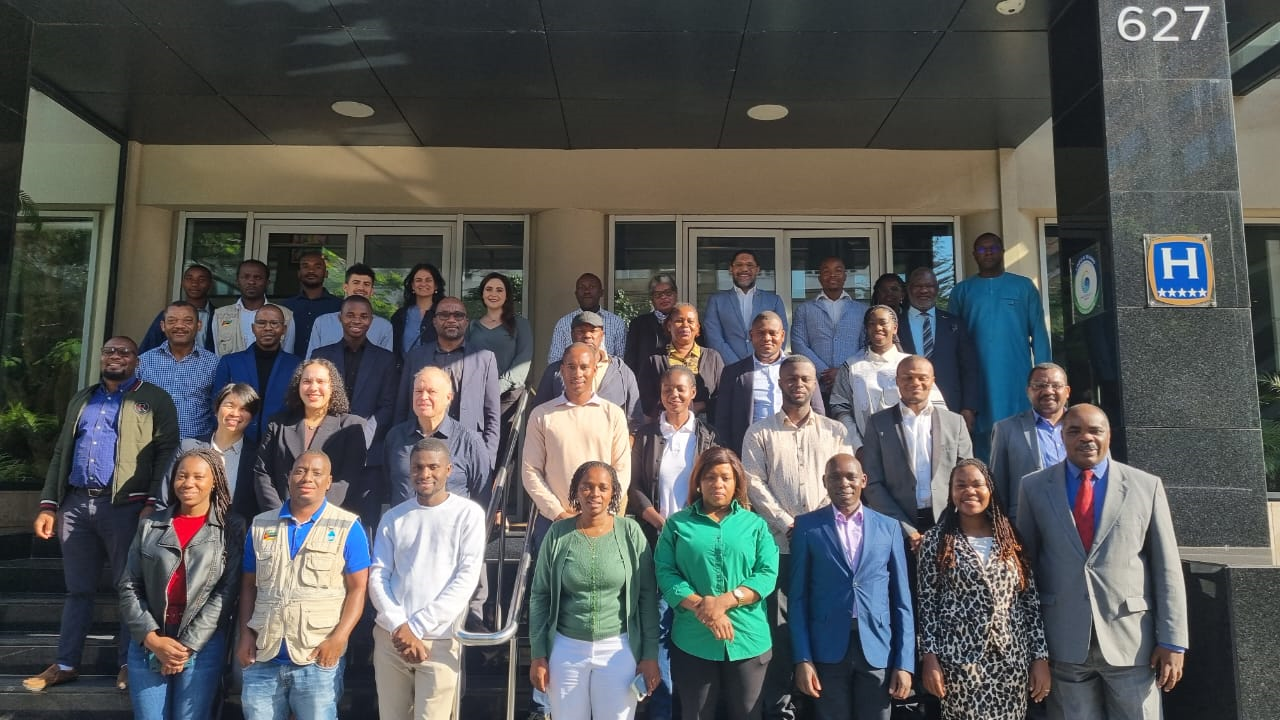
(A group photo of stakeholders gathered outside Avenida Hotel in Maputo, July 2024)
In a concerted effort to enhance Mozambique's resilience to disasters, the Regional Centre for Mapping of Resources for Development (RCMRD), with support from the United Nations Office for Disaster Risk Reduction (UNDRR), spearheaded a comprehensive five-day training workshop on Drought Risk Information and Early Warning Systems for Mozambique. Held at the Hotel Avenida in Maputo from July 1st to 5th, 2024, this workshop brought together an array of esteemed stakeholders and experts to fortify Mozambique's capacity to mitigate drought risks.
The workshop, officially inaugurated by the Vice President of INAM, Mussa Mustafa, who urged the participants to actively learn and apply the skills gained to enhance their effectiveness in managing drought risks. This was a collaborative endeavor involving West African Science Service Centre on Climate Change and Adapted Land Use (WASCAL), CIMA Foundation, Stellenbosch University, and the Disaster Mitigation for Sustainable Livelihoods Programme (DiMSUR). Participants included key actors from the National Institute of Meteorology (INAM), University of Eduardo Mondlane (UEM), National Institute for Disaster Management (INGD), National Directorate of Water Resources Management (DNGRH) and Regional Water Administration for Southern Mozambique (ARA-SUL).
Throughout the week, participants gained invaluable insights into drought risk management, focusing on advanced methodologies for hazard assessment and early warning systems. WASCAL, RCMRD and UEM led the stakeholders in generating disaster risk information using cutting-edge technology, hands-on exercises in Python for climate risk data scraping and formatting. Discussions encompassed methodological approaches to drought hazard assessment, the development of information products tailored for Mozambique, and the identification of drivers and modulators of drought, such as triggers and spatial extent. Demonstrations of drought mapping using machine learning algorithms and other essential tools for monitoring and forecasting droughts further enriched participants' knowledge, equipping them comprehensively to enhance resilience.

(Facilitators during the workshop: From left: Frankline Rono (RCMRD), Seyne Salack (WASCAL) Isabel Gomes and Bruno Colavitto (CIMA) and Arthur Chapman (UEM))
A pivotal aspect underscored by the CIMA Foundation was the role of effective communication in managing drought risks. They led an interactive session on Communication and dissemination of Warning Messages: Early Warning System and Bulletin, emphasizing the need for consistent coordination and leveraging synergies for multisectoral success. Efficient sharing of information among stakeholders is crucial for the timely dissemination of risk information, which is instrumental in planning and policy formulation. By improving communication channels, Mozambique can better coordinate its efforts in drought preparedness and response, ultimately enhancing the resilience of communities.
Additionally, during the session, CIMA Foundation examined the Existing Early Warning System (EWS) on drought in Mozambique by INGD. Discussions were structured around two key components of the bulletin: the first part focused on definitions of triggers and thresholds, while the second part delved into warning messages and strategies for effective dissemination.
Furthermore, the workshop was in line with the Early Warning for All initiative's key pillars, that is enhancing risk information, observation, monitoring and forecasting, communication and dissemination, and preparedness and response. This approach was structured to strengthen Mozambique's early warning capabilities.
Participants engaged in practical activities during the training, applying the acquired skills to real-life scenarios. This hands-on approach deepened their understanding of drought impacts and strategies for mitigation. The collaborative setting fostered lively discussions and the sharing of best practices among professionals dedicated to reducing disaster risks in Mozambique.

(Stakeholders sharing insights from their group discussions during a session.)
This workshop marks a pivotal step in Mozambique's journey towards building resilience against drought. By providing local stakeholders with advanced tools and knowledge, this initiative aims to bolster the country's capacity to anticipate, prepare for, and respond to droughts, ultimately safeguarding livelihoods and promoting sustainable development.














